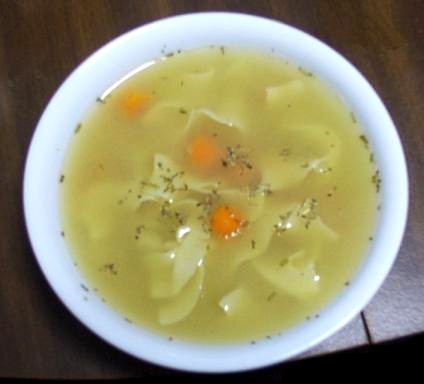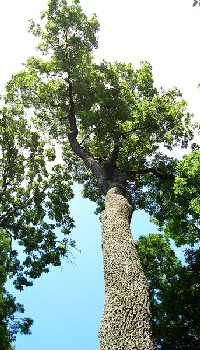
Fluxes/Diarrhea and Related Illnesses Page Menu: 1 2 3 4 5 6 7 8 9 10 11 <<First
Treating Fluxes in the Golden Age of Piracy, Page 10
Treatment of a Flux: Case Study
The esteemed physician Thomas Sydenham gives an interesting case study for the treatment of a dysentery that incorporates several of the treatment methods we have discussed. I am presenting the key sections of his discussion to tie some of these treatments together.
Photographer: Marciej Jaros
European Ash Tree I should first immediately cause a Revulsion of those sharp Humours [brought on by an accompanying fever] by bleeding, and afterwards attemperate the other Mass, and also evacuate the said Humours by Purges. I used this Method when I was first call'd; I bled in the Arm, and at Night I gave an Anodyne, and the next Morning this lenitive purging Potion [an emetic], which I frequently use.Take of Tamarinds, half an Ounce; of the Leaves of Sena, two Drams; of Rhubarb, one Dram and a half; infuse them in a sufficient quantity of Water: to three Ounces of the strained Liquor add of Manna [A sugary water exuded by ash trees - a purgative] and Syrup of Roses Solutive, each one Ounce; and make a Potion, to be taken early in the Morning.
I prefer the Potion before any Electuary made of Rhubarb in a small Quantity; for tho the Rhubarb is proper to evacuate Choler [yellow and black bile - two of the four humors], and any sharp Humour, yet unless such a Quantity of Manna, or of Syrup of Roses, or the like, be mixed with it, as may cause it to work well, it does not much conduce to the Cure of the Bloody Flux.
And because 'tis very obvious that purging Medicines, tho they be ever so gentle, do heighten the Gripes and cause a general Disorder and Depression of the Spirits by the adventitious Tumult they raise in the Blood and Humours; therefore I commonly give an Anodyne somewhat earlier than is customary after Purging, viz. at any time of the Afternoon, if the Purge seem to have done working, whereby I may be able to appease the Tumult I have rais'd.

Artist: Mary Beale
Author Thomas Sydenham
I repeat the said Purge to be taken twice every other day, and given an Anodyne after every Purge at that time above-mention'd; and I order this to be used Morning and Evening, when the Patient does not purge, that I may suppress the Violence of the Symptoms, and gain a Truce while I am evacuating the peccant [offending] Humour.
The Anodyne I us'd was chiefly Liquid Laudanum, viz. sixteen or eighteen Drops in any Cordial Water, for one Dose. After Bleeding and Purging once used, I allow thro' the whole course of the Disease any temperate Cordial to be taken now and then, as Epidemick Water, and compound Scordium Water, and the like. For instance,
Take of Waters of Black Cherries, and Strawberries, each three Ounces; of Epidemick water, or compound Scordium-water, and of Cinamon-water hordeated [made with barley], each one Ounce; of prepared Pearl one Dram and a half; of Crystalline Sugar a sufficient Quantity; and half a Dram of Damask-Rose-water to make it pleasant to the Taste: mix them and make a Julep, whereof let him take four or five Spoonfuls when he is faint, and at pleasure.1
But if the Disease was obstinate, and did not yield to these things, I prescrib'd the forementioned Paregorick [pain-killer] every day in the Morning and at Bed-time, till the Sick was quite well; and that it might be the more certainly quell'd, I gave the aforesaid Laudanum every eighth Hour, that is thrice in the space of a natural Day, and a larger Dose than I have mention'd above, viz. twenty five Drops, if the former Dose could not restrain the Flux.
Moreover, if the former Dose could not retrain the Flux. Moreover, I order'd a Glister [Clyster - enema] made of half a Pint of Cows Milk, and of an Ounce and half of Venice Treacle, to be injected every day, which is truly very beneficial in all manner of Fluxes of the Belly...2
1 Thomas Sydenham, The Whole Works of that Excellent Practical Physician Dr. Thomas Sydenham, 10th Edition, p. 120-1; 2 Sydenham, p. 122
Flux Related Treatments
There are several other treatments related to the cure of a flux that fit here. We are going to begin these infal sections with some additional comments from Cockburn that are specific to the cure of Lienteries which didn't really fit into the preceding sections. Then we look at some advice on treating some of the symptoms that would accompany a prolonged diarrhea including weakness, dehydration and mariscas.
Flux Related Treatments: Lientery

Artist: David Teniers the Younger
A Physician Examining Urine (16th c.)
In the case of a lientery, Hippocrates explained that in "lienteries of long standing, an acid belching, where nothing of this kind has happened before, is a good sign; as in the case of Demænetas. Art at this time should try and imitate nature; for such disturbances make a great alteration, and perhaps acid belchings will carry off a lientery."1 William Cockburn explains this a bit differently in his book. "When four Belchings... that were not before, come upon a sick Person who has been long ill of a Lientery, as it happened to Demeyera, they are a very good Sign. Perhaps we may procure them by Art."2
Where he comes up with four burps is a mystery. Of course the version of Hippocrates that I am quoting from is dated 1846, whereas his version was no doubt very different. Whatever the reason for choosing four belches, he explains that "Belching is good, because it shews us, that the natural Heat, which before made no change in our Meat [in the intestines], is become more powerful; so that it begins to change and concoct it. Now though these Belchings are the Effects of a Degree of Concoction, which is so much wanted when Men have a Lientery; but as this is at best ...a Sign only... it were to no Purpose to attempt the provoking of Belching"3.
Instead, Cockburn explains that those with lientery "require a Cure, till their Urine bears some Proportion to what they drink, and till their Skin puts off its dirty Colour"4. So now you know exactly how to tell when a lientery is cured, although it would seem to be more straightforward to just ask the patient about their stools.
1 Hippocrates, The Writings of Hippocrates and Galen, translated by John Redmon Coxe, p. 374; 2 William Cockburn, The Nature and Cure of Fluxes, p. 221; 3 Cockburn, p. 223-4; 4 Cockburn, p. 227
Flux Related Treatments: Weakness
John Woodall noted that as a sailor suffered with a flux for a long period, he grew "very feeble, his bloud being wasted"1. His first remedy for this had to do with the patient's food. Woodall advised

Mom really did know best, didn't she?
the surgeon to "appoynt him a diet that may warme and comfort the stomacke, namely, at land if it may be had, Brothes of Chickings or the like, with some spices therein, and egges and sugar, and a little rose water, but not honey, for that increaseth griping, and cawdels [caudels - syrupy gruels] with egges wine and spices, according to good discretion will doe well, if they may be had"2. In case you missed it, his first suggestion was... chicken soup! Perhaps that's where the idea that it was good for a cold came from. (Although probably not.)
Next, Woodall resorts to one of his favorite cures: the clyster or enema. This was to be used "if there be feare of excoriations in the guts... [using] a decoction of Barley or Bran, or of Bran onely with Deere suet {2 ounces} let not your decoction be too slimy of the Bran, and adde if you can get it, the yolke of one egge, for egges comfort much and swage paine, the yolke of an egge must be well beaten with the decoction by little and little, so taken very warm"3. So there you have the cure for weakness brought on by diarrhea: chicken soup, followed by a nice, comforting enema of bran and eggs. Try it next time you find yourself weak from a diarrhea.
1 John Woodall, the surgions mate, p. 209; 2 Woodall, ibid.; 3 Ibid.
Flux Related Treatments: Dehydration
When discussing how to cure a flux, military surgeon Raymund Minderer noted that the surgeon had "also to think upon means to obviate Symptoms of this Distemper, and particularly Drought, which is wont very much to torment people in this Disease."1 We sometimes tend to think that the understanding of dehydration is sort of a modern thing, but Minderer's comment suggest otherwise. Certainly dehydration (or 'drought' as Minderer refers to it) is a particular problem for someone with a diarrhea of long-standing.
Minderer goes on to debate various types of beverage remedies and how well they might work in this case.
'Tis true, Acid things do quench thirst, but they cannot be used boldly, and therefore you must use them with great discretion and wariness. And as for sweet things, they usually increase thirst, and do easily corrupt, and turn into gall.

Photographer: Mike Bardill, Chalybeate Spring Well in Quarndon
Wherefore, give to the Patient preserved Currans [currants]; or if fresh ones be in season, mix a quantity of them with Honey or Sugar, and give him of it to eat upon white-Bread and Butter. Or plump dried Black-cherries, or dried Damascene-prunes in half Wine and half Water, and let him hold & squeeze them in his mouth.
Or, if you can, mingle some Almond-milk with Chalybeat-water [mineral spring water], and let him drink thereof; and this is both meat and drink. Or let him drink water, wherein Coriander and roots of Tormentil have been boiled. Or boil in water dried slices of Quinces, roots of Bistorta or Snake-weed, and burnt Harts-horn, put into it a tosted crust of Rye-bread rubb'd with Nutmeg, but let it not lye in it above a quarter of an hour, lest the water should thicken and become viscous. Marmelat [jelly] also of Quinces, Black-cherries, and Sloes is proper in this case, giving the Patient a slice of it to hold upon his tongue, and so to swallow it down.2
Careful reading of quote will probably surprise you as well as remind you that there really is nothing new under the sun. If it weren't for all the period spelling and the addition of some of the astringent herbs, you might have been reading a Reader's Digest article on how to rehydrate yourself after a long illness.
1 Raymund Minderer, A Body of Military Medicines Experimented, Volume 4 of Paul Barbette's, Thesaurus Chirurgiæ, The Fourth Edition, p. 77; 2 Minderer, ibid.
Flux Related Treatments: Mariscas
Our final flux related problem is another one Minderer comments upon: the mariscas. If you're confused about what this means, it is also referred to in the period literature as a sore fundament [anus] which Minderer explains "do torment Men especially" in this illness.1

Photographer: H. Zell
Red Hound's Tongue or Cynoglossum Officinale
He goes on to explain that this condition "may be cured with Oyl of Eggs, Salve of red Hounds-tongue [Cynoglossum officinale], as also with
the Unguentum Populeum [an unguent made of the dried leaves of poppies, belladonna, henbane, black nightshade, and poplar buds], or with Butter stirr'd up and down in a Leaden Mortar, till it turn grey or blackish."2 Herbalist Robert James explains that cynoglossums "are of a refrigerating and drying nature" which stop fluxes.3 He also tells us that the Poplar Ointment "is intended for a cooling Topic, but is not much in Use."4
Minderer goes on to advise giving the patient "Scrophularia or Fig-wort [a plant that inhibits inflammation], infused in his drink, this being a specifick for that evil. Also the Oyl of Mullein, Elder-blossoms, Water-lilly, and White-lillies, is an excellent remedy for it, a rag dipped therein being laid upon the part affected. To use scarifying [making a series of small incisions to bleed the patient] on the lower part of the back-bone, is also very good, though it be very painful."5 James explains the Mullein is useful "in mitigating all Kinds of Pains, particularly in Tumor of the Anus, and in Hæmmorhoids."6 He credits Elder-flowers with being anodyne7, and gives white lilies the power to supplicate and ease pain.8
1 Raymund Minderer, A Body of Military Medicines Experimented, Volume 4 of Paul Barbette's, Thesaurus Chirurgiæ, The Fourth Edition, p. 79; 2 Minderer, p. 79-80; 3 Robert James, Pharmacopœia universalis, p. 306-7 4 James,p. 752; 5 Minderer, p. 80; 6 James,p. 465; 7 James,p. 429; 8 James,p. 358


